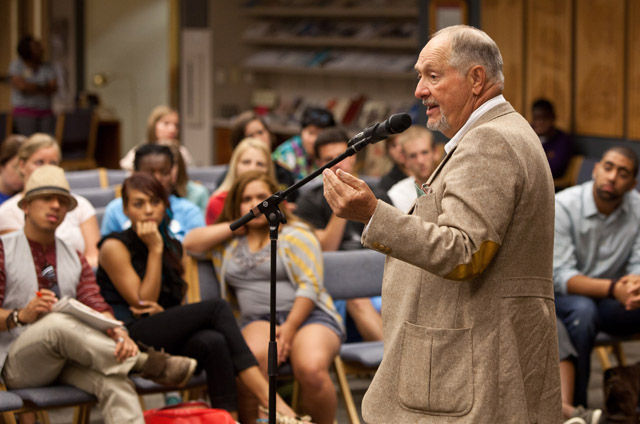Page 5 • (591 results in 0.038 seconds)
-

November 1, 2010 Why does Angela Pierce care about social justice? “Social justice to me is speaking up for those who are left unheard,” said Angela Pierce, “and helping others find their place.” By Kari Plog ’11 Angela Pierce is the daughter of a Filipino mother and a Caucasian father. She never saw herself as white. At some point, however, Pierce realized other people did see her as white. She noticed when she saw people treating her different than they did her mother. It was then she knew
-
, texts, and contact via social media, unwanted gifts, showing up/approaching an individual or their family/friends, monitoring, surveillance, property damage, and threats.” (SPARC, 2021). Because many stalking behaviors can be benign or even nice gestures OUTSIDE of a stalking relationship, and not a crime on their own, it’s common for people to not recognize these behaviors as stalking (e.g., an ex sending flowers or showing up where you are unannounced). Stalking did not even become illegal until
-

identities — a first-generation graduate and a woman in academia — intersect, especially when it comes to hard work. “I always have done what I’ve needed to do,” Ceynar said. “I think that comes from growing up in a blue-collar kind of background.” The same approach applies for female faculty members: “We just kind of do what we feel like we need to do to get good teaching evaluations, and do what we think students are expecting and what is expected of us.” But Ceynar says a frustrating feeling results
-
Lutheran University. And for her, the two identities — a first-generation graduate and a woman in academia — intersect, especially when it comes to hard work. “I always have done what I’ve needed to do,” Ceynar said. “I think that comes from growing up in a blue-collar kind of background.” The same approach applies for female faculty members: “We just kind of do what we feel like we need to do to get good teaching evaluations, and do what we think students are expecting and what is expected of us.” But
-

mind. He then woke up in jail. Still alive, but changed. It wasn’t the last time he would end up in jail. It had been his first demonstration as a field officer for the Student Nonviolent Coordinating Committee. It was the early 1960s in Mississippi. As a civil rights activist, he was there to lead a peaceful protest condemning the murder of an African American man whose supposed crime had been registering to vote. Zellner, now 72, shared his story with students last week as the kick-off for the
-
magicA Psalm for the Wild-built by Becky Chambers A short tale on robots returning to humanity after leaving for the wild. Read if you love… solar punkLegends & Lattes by Travis Baldree This is a story about an ex-soldier opening a coffee shop in a high fantasy setting. Read if you love…queer fiction, found family, or D&D. Yellowface by RF KuangYellowface explores issues of diversity, racism, and cultural appropriation as a white author claims to be their Asian-American rival. Read if you love
-
Why Study Criminal Justice?As a student of criminal justice at Pacific Lutheran University, you will investigate theories of criminal offending, the functioning of the criminal justice system, and the experiences of crime victims. Our sociologically-informed criminal justice program emphasizes an understanding of the social and structural contexts in which crime and criminal justice system take place.Why Study Criminal Justice at PLU? Complete an internship with a criminal justice agency
-
Annual Disclosure of Clery StatisticsCampus Safety is responsible for the compilation of the annual crime statistics and publication of this guide as required by federal law. The crime statistics found on the last page of this guide represent all crimes known to the Campus Safety administration and include those crimes reported to other departments on campus. Each year the Campus Safety Department contacts all departments on campus to whom reports of crimes may have been made and requests their
-

lot of her policy work right now has to do with mental and behavioral health, and sponsoring a bill from high school students on banning the pink tax (a term used for gender-based price differences applied to identical products). She’s also working on mental health competency, or forensic competency, so finding ways to improve our criminal justice system for people who have mental health issues and are being convicted of a crime, and making sure they are getting treatment as well as standing trial
-

for people who have mental health issues and are being convicted of a crime, and making sure they are getting treatment as well as standing trial. So making sure that they are mentally competent enough to fully understand the grievousness of their crime and of their actions. What tasks that you perform in your job were unexpected? I really like taking constituent meetings, and I really like hearing people’s stories about what problems they face, because it impacts them in a more personal way
Do you have any feedback for us? If so, feel free to use our Feedback Form.


